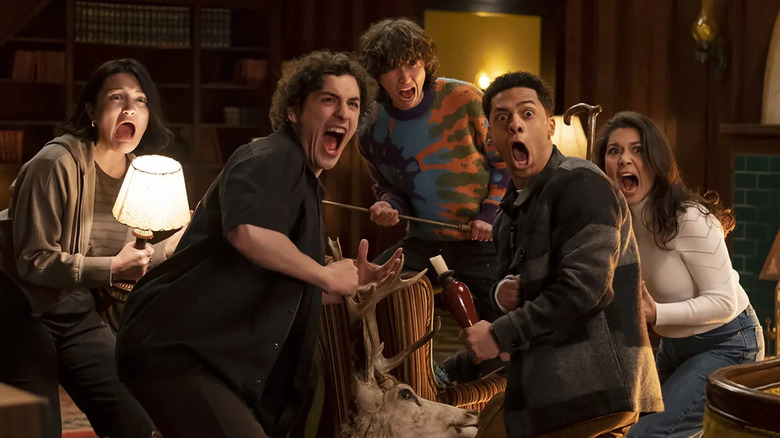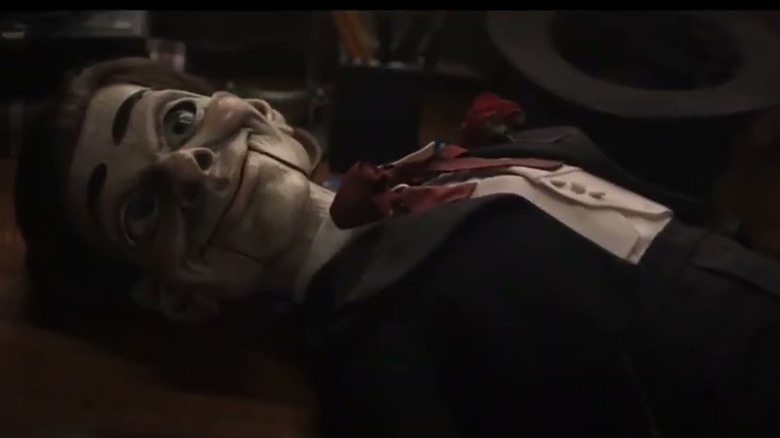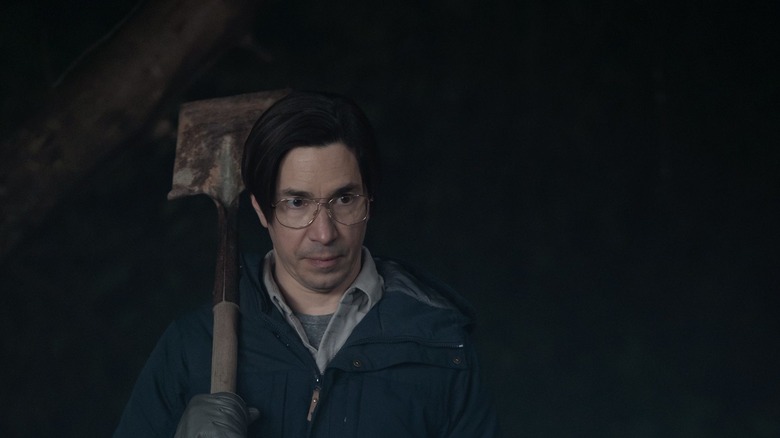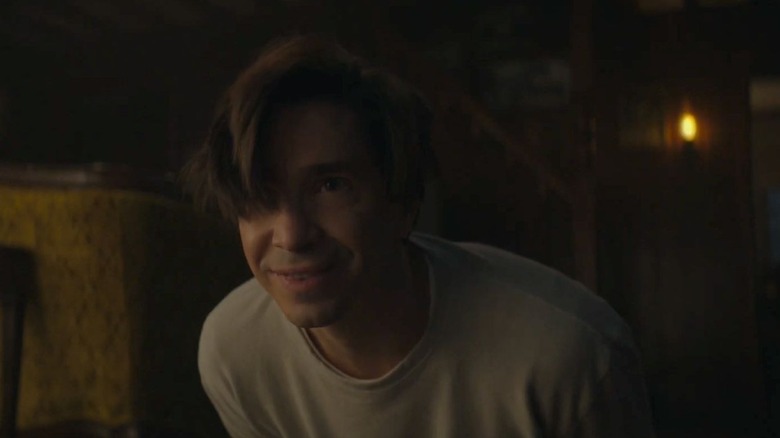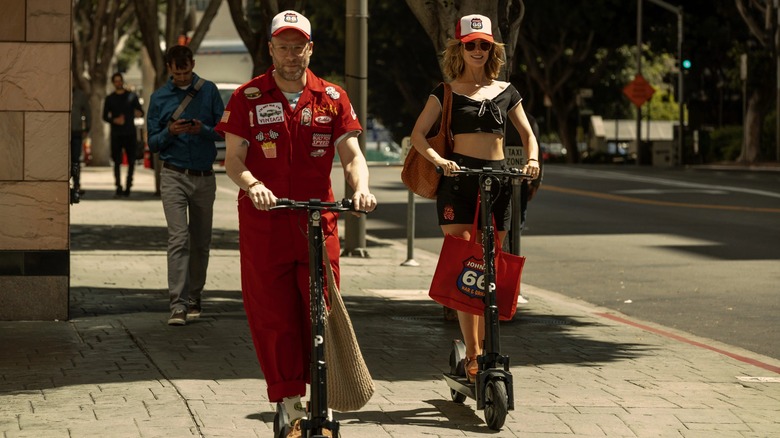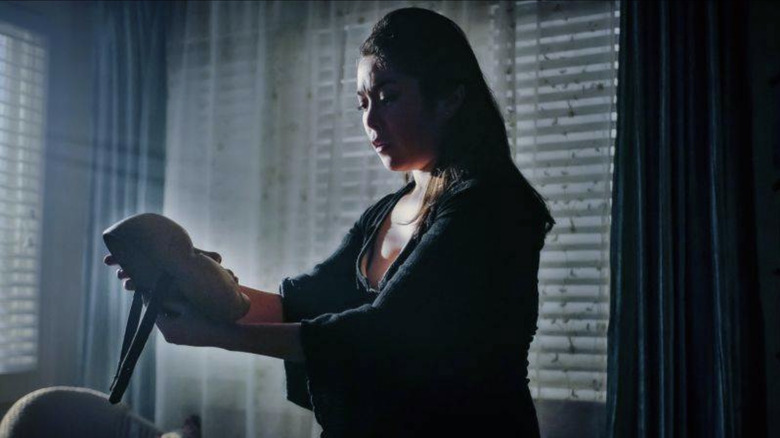Goosebumps Executive Producers On That Huge Season 1 Twist And Justin Long's Improv [Exclusive Interview]
This post contains spoilers for "Goosebumps" episodes 9 and 10.
Readers beware, you're in for a scare ... just kidding. It's an interview. But! It is related to the new Hulu and Disney+ adaptation of "Goosebumps," based on the beloved young-adult horror series of the same name from R.L. Stine. In just 10 episodes, the new "Goosebumps" series is a triumph of horror, comedy, and some well-placed nostalgia — a series that speaks to both the generation that grew up begging parents to buy them the books from the Scholastic Book Fair and raced home to watch new episodes of the TV show after school (It's me. Hi!), as well as new viewers getting into the "Goosebumps" universe for the first time. When I reviewed the new show, I had only been given the first eight episodes, which felt like its own contained season. But with two more episodes unseen, it was a sign that the creative team had one more scare up their sleeves.
/Film's Ethan Anderton spoke with executive producers Pavun Shetty and Conor Welch at the start of the series, but with the season 1 finale available to stream, I was fortunate enough to talk with series developers Rob Letterman (director of the 2015 "Goosebumps" movie) and Nicholas Stoller ("Forgetting Sarah Marshall," "Platonic"), as well as executive producer and writer Hilary Winston ("Community," "My Name is Earl") about how the shocking episode 9 twist came to be, and whether or not we can expect a season 2.
Note: This interview has been lightly edited for clarity and brevity.
Disney didn't try to tone down the fear factor
I binged those first eight episodes in one sitting and thought "Oh, that was a delightful season. I'm very glad I watched that ... wait, there are two more episodes?!" So my question is, did you always know that the series was going to have this penultimate twist? Or did this come about organically in the writing process?
Winston: One of the things that we've all talked about is that we really didn't want to just either stretch out the season and put in some filler, and we also didn't wanna leave the audience with like, "Okay, this parent story is resolved, and the middle story is resolved," because Slappy wasn't resolved. And we really didn't want to just end it with Slappy's just evil for evil's sake and we have no idea why. We wanted to challenge ourselves to get into the origin story of Slappy and find out about Brad, and the story of that family to give ourselves a second after [the first story] was done to ramp into the finale.
It was such a treat, because we don't get a lot of those "out of nowhere" twists anymore. There's also been a lot of talk throughout the season about how this is a darker, more mature take on "Goosebumps." But there are a handful of moments I was genuinely shocked you got away with, especially in these last two episodes where you essentially burn the whole city alive. Was there any pushback from the powers that be to tone it down?
Stoller: Early on, we said to Disney, "How far should we go?" Like, "What's the line here?" And they were like "You just do what you're gonna do and we'll tell you if you've gone over it." So we tried to be true to the books, and certainly age them up by aging up the characters. But our goal really was for this to be a lot of fun, and for it to be really scary, and for it to be funny, and for it to be entertaining. We have the twist in those last episodes, partially, because, as Rob is always saying, the "Goosebumps" books always have a twist. That's part of the nature of the books. But also, I'll say, one of the downsides of "Peak TV" is a lot of filler. I'm sure you've experienced it, where you're just treading water for a few episodes, and there's nothing I hate more than when someone's like, "Wait till episode 6. It gets good in episode 6!" But yeah, but I think in terms of horror, Disney kind of let us do our thing.
Letterman: They were really supportive of the tone, and in the best way — and it's gonna sound weird coming from Disney, but they didn't want it to be juvenile, so it was surprising for us and music to our ears. They were supportive the whole way.
Stoller: Their most successful things appeal to everyone. I mean, my six-year-old's favorite movie is "WALL-E" and that's one of my favorite movies. Literally works for everyone.
Letterman: That was the big thing: Making sure it worked for everyone. And the reason we aged it up, really, for one, we just wanted to tell more mature stories. But also, "Goosebumps" fans have grown up since the '90s, and so there are "Goosebumps" fans in their 30s and 40s, and we didn't wanna leave them out and wanted to make sure it worked for them whether they had kids or not. And also, for the new, younger audience coming around. We had to make something that worked on both levels.
The influence of Stephen King
I think you succeeded in that. I'm a '90s baby, and I once won a trivia competition that was "Goosebumps" and "Are You Afraid of the Dark?" on a team alone. And this show speaks to me even now that I'm in my 30s. In the numerous adaptations of "Goosebumps," R.L. Stine, the man, always has a literal presence or an inspirational presence. I caught his voice as the podcast host and that was a nice treat, but Nathan Bratt's character feels like he's cut from a similar cloth as Stephen King's insert characters. Was that intentional or merely a coincidence?
Letterman: There's a history of Stephen King being mentioned throughout "Goosebumps." We made a joke about it in the movie: Jack Black gets offended every time someone compares him to King. But going all the way back to meeting R.L. Stine for the first time, and he kinda gave a history of how he came to [be a successful writer], and he was all about comedy and he didn't know anything about horror, and he grabbed a bunch of horror books from the library and learned horror really quickly. What he did that was so genius was he never pandered to a young audience. He actually was writing Stephen King-type books that were accessible to a young audience. So it's always kind of under the hood with "Goosebumps."
Definitely. And Rob, this one is more for you since you worked on the movies as well. I consider myself very spoiled that I got to grow up with "Goosebumps," "Are You Afraid of the Dark," "Eerie, Indiana," and "So Weird." These horror shows had a bend where they were digestible for kids but never talked down to kids. I'm curious if the approach to the series was different compared to the films, which skew a little younger.
Letterman: Well, besides the lower budgets ... [laughs] I didn't write the movie. That was something that I auditioned very hard for because I really wanted to get it. The movie had a meta idea about "Goosebumps." It wasn't tied to any of the book stories, per se, and had this really unique take on it and it became its own thing. It was very much an Amblin movie, very "Goonies"-inspired, and kind of played into all those '80s tropes of Amblin movies that are near and dear to my heart. The "Goosebumps" series, though, when it when it bubbled back up and I called Nick — we're staring at a blank page. And [Disney] was like, "Reboot it. Do whatever." Our first instincts were like, "Let's do something different and fresh with it," because a lot has been done with "Goosebumps," and "let's serialize it and age it up," because the audience has grown up with it as well. And we both have teenagers, and we're looking at the world through that lens now and it's tough on teens right now. There's real stuff going on. They don't need demonic possession to be scared. There's a lot going on. So a lot of those things were kind of influenced in the series.
Justin Long: Scream King
I'm glad you mentioned the teens, because I used to teach. I've taught children school shooter drills. I know what they can handle, and they can handle a lot more than what a lot of powers that be think they can. And all of these characters do feel very lived in. This is not a question. I'm just complimenting you on being able to successfully write teenagers in a landscape where so many teen characters just sound like, "That's a Gen X reference coming out of a 19-year-old's mouth."
Stoller: Thank you!
Letterman: Aww!
But I was recently talking to Michael Kennedy, who worked with Justin Long on "It's a Wonderful Knife," and he mentioned they were only able to cast him because he was working on "Goosebumps" with you all up in Canada, and he mentioned that Justin was a very active part in workshopping his character. I was curious if you all had a similar experience with him.
Letterman: Listen, the whole cast is amazing and elevates everything, and Justin in particular is really incredible. I mean, we're so lucky. We talked about how we couldn't believe we got him after "Barbarian" — that alone was a win for the show. But it did bubble up, and yes, he has a lot of input in the best possible way, and all of us love to improv and encourage that from the actors. So we knew Justin had those chops. But it really started to blossom, I think in episode 3, Nick was pitching this idea of like, "Oh, what if he's possessed by a teen? What if he just like we just had this dance number, but it's the teen moving his body?" And then, the minute he had that idea, it just popped for Justin and it just defined the whole possession thing. It was really kind of amazing. You could see all his physical comedy, and he got really dark. Like he got scary and then switched to silly. It's amazing what he does. So yeah, he does workshop and we do encourage it a lot.
I got the first sense of it during the pilot when we were shooting, and we're kind of towards the end of the schedule, and he was like, "Hey man, can you just let the camera run? I'll try some stuff off the top of my head." I was like, "Yeah, man. Do it. Go for it." And it was in the scene in the Biddle House at the party and there's, you know, 50 background extras, all looking at Justin. And he starts riffing. And he riffed for like 20 minutes! It was incredible, like, it was amazing. All the ideas kept flowing. And that's when it was like, "Okay, this is serious talent and you can let him do all kinds of stuff."
Winston: He's a really hard worker, I mean, everybody in the cast works really hard, but it sets a good example of somebody that is really thinking about everything that they're doing. You know why they're doing it. And it's one of the reasons why it's so hard to cut down his scenes, because there'll be all these moments, like the way he picks up a spoon to eat the worms. Everything has so much intention behind it. Even just the way he gives a look to Rob Huebel, who plays Colin. It's almost impossible to cut his stuff because he's so there, and there are so many little things you don't want to miss.
Jumping between Platonic and Goosebumps
Totally. So, this one is for you, Nick. "Goosebumps" is definitely one of my favorite shows this year, but so is "Platonic," and I feel like I'm like a one-woman parade for "Platonic." What was it like jumping between these two very different worlds?
Stoller: Oh, thanks so much, that's so sweet. Yeah, I mean, "Goosebumps" is something I've never gotten to do. I love horror but I've never been able to do horror before. As you probably know, I mainly just do comedy. And genre is really exciting. My wife and I created "Platonic" based more on her experiences with her male friends. And as Seth [Rogen] said, "10 years ago, 'Platonic' would have been a movie, and now it's a TV show." So we approached it like we would one of our movies. We wanted to be certainly emotional but very funny, and really dig into this idea. And Seth and Rose [Byrne] have such amazing chemistry!
But in terms of jumping between them, I just always feel like I'm just trying to tell honest stories, you know? When something's deadly serious, some part of me is calling B.S. on it. I don't think life is like that, you know? I mean, things are serious, but I don't think people's reactions to them are always deadly serious. I would say that's true of my favorite movies. One of my favorite movies is "The Shining," and that movie is terrifying and serious, but it's also very funny and very weird. So I think the thing that connects the two shows and that connects everything I've ever done is that sense of humor about it. Both shows are about serious, bittersweet things happening, but obviously our approach is to try to be funny. I think that's the more honest approach for me, at least.
Comedy is my coping mechanism as well, and I think about "Platonic" every time I visit Vidiots here in L.A. because there's, like, a Bird scooter graveyard across the street.
Winston: Oh my god, I love that in "Platonic."
Every time I see it I just think, "I wanna throw them." [laughs]
Winston: I love that [Seth Rogen's character]'s hatred is never explained, either. There's no monologue like, "A Bird scooter hurt me one time ..." [laughs]
We need to get back to it being fine to be a hater sometimes. [laughs]
Letterman: YES!
Stoller: Totally!
Winston: YES!
Like, we don't have to moralize being a hater. Sometimes you just don't like things!
Winston: YEAH!
Will there be a season 2 of Goosebumps?
To close things out I have a very obvious question: We're getting a season 2, right? Or do I need to start picketing outside Disney again, 'cause I'll do it!
Winston: I think you should do it. [laughs]
Stoller: We certainly hope so. I mean they, you know, with all the streaming stuff, they don't tell us much. But there was a lot of, like, smiling! And Rob, you said you got a "Goosebumps" blanket, which is –
Letterman: Didn't you get the blanket? It's rad! The blanket's awesome. That's my metric for how successful this show is.
Winston: Yeah, if they give you swag, if they're making swag, if there's a swag budget...
[laughs] How good the wrap gift is determines the future. Incredible.
Letterman: Yeah, and we got cool stuff, guys!
"Goosebumps" is available to stream on Hulu and Disney+.
